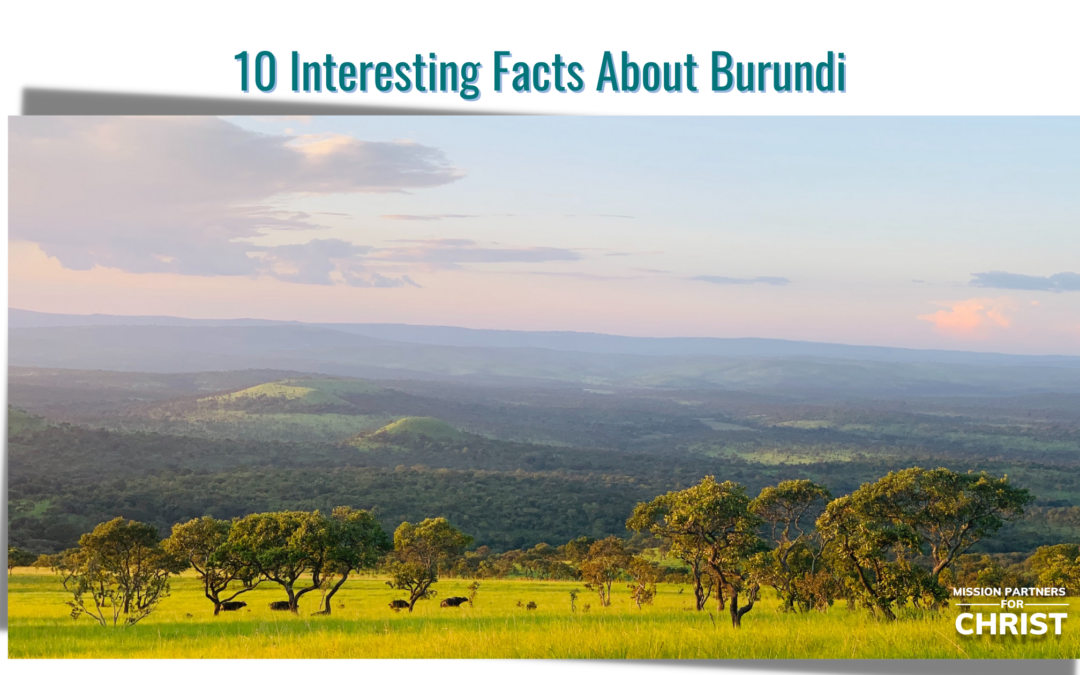As many of you may know, Mission Partners For Christ is headed to Burundi this summer. We could not be more excited to go.
We had originally planned to go a few years ago, but we had to postpone the trip due to the Covid-19 pandemic. Thanks be to God: we are now finally able to go and to serve. And we would love for YOU to join us!
To help you understand the country a little bit better, we wanted to share a little slice of information about this beautiful nation: the history, the language, the culture. Each part is a beautiful mosaic that makes up the nation of Burundi.
Ten Facts To Know About Burundi:
1. While the Tutsi, Hutu, and Twa people have lived in the region for more than 500 years, the Republic of Burundi is actually very young. Burundi, originally part of the Kingdom of Rwanda and known as Ruanda-Urudi, was colonized first by Germany and then by Belgium. Burundi gained independence as a nation in 1962, and became known as The Republic of Burundi in 1966.
2. The Hutu people make up a large majority of the estimated 12,857,000 population (upwards of 80%), while the Tutsi people are a minority, making up roughly 15% of the population. Other people groups, such as Twa, Lingala, and more make up less than 5% of the population all together.

3. The Burundi flag is full of symbolism that refers back to the small nation’s origins. The two green triangles symbolize hope and optimism. The white cross and circle both stand for purity and peace. .The red panels symbolize the blood that was shed for Burundi’s independence. The three stars in the middle of the flag are representative of two things: the three major ethnic groups of Burundi (Hutu, Tutsi, and Twa) and the country’s motto, “Ubumwe, Ibikorwa, Iterambere” (“unity, work, progress”).
4. Visual arts are an important piece of Burundian culture. From decorated papyrus celebrating Burundi legends to ceramic art, introduced by Italian missionaries in the 1960s, art is a staple of Burundi life. You can see some of Burundi art, and even book a 3D virtual tour, in the first-ever Burundi art gallery, TwoFiveSeven Arts.
5. Sports have been a uniting factor for Burundians. Decades of war and poverty necessitated a common goal to bring people together, which sports and athleticism has provided. Football (soccer) is a popular sport, and Burundi has participated in The Africa Cup Of Nations tournament on several occasions. You might also recognize the name, Vénuste Niyongabo, who won Burundi’s first Olympic gold medal for the 5,000-meter race in the 1996 Olympics.

6. Burundi has two official languages, Rundi and French.
7. The official currency of Burundi is known as Burundi Franc (FBu).
8. There is no official religion, but religion does play a major role in the backdrop of Burundi life. Up to 65% of the Burundi population identifies as Roman Catholic, 15-25% identify as protestant, 2-5% identify as Muslim, and the remaining population practices indigenous faiths.
9. Due to Burundi’s turbulent history with civil war and unrest, medical care has been hindered and left inaccessible by much of the population. In 2018, Burundi was listed in the World Hunger Index as the country with the highest rates of malnutrition. The people of Burundi need access to medical care, just like the rest of the world and yet in 2015 it was estimated that 1 in 10 Burundi children died from preventable disease before the age of 5. This is why Mission Partners For Christ has prioritized Burundi as we rescheduled trips that were delayed due to the pandemic. We recognize that every person, created with love by the God we worship, deserves accessible healthcare.
10. Burundi was listed in the 2018 World Happiness Report as the least happy people in the world. This fact is heartbreaking to consider when we know that every single person who calls Burundi home is a human being who was made in the image of God. We know they deserve to live happy lives, and we hope to show at least some of them the hope that lies in Jesus Christ.
What To Expect On Our Burundi Medical Mission Trip
We will be serving in a rural location in Burundi alongside Burundian doctors and with our partner, CAPRO Calvary Ministries. We will be encouraging them in their work and assisting where able. We’ll be providing an eye care clinic and providing “The Shoe That Grows” to those in need of good footwear.
We will also be providing counseling and prayer for those who need it and sharing the gospel as the Lord opens those doors for us.
Applications are closing shortly, however if you feel the conviction of the Holy Spirit to join us in Burundi, we urge you to sign up now. If you have concerns about finances, you may find this blog post encouraging. If, on the other hand, fear of the unknown is holding you back, you may find this post to be helpful.
Want to learn more about Burundi? Click here for more.
Don’t delay: Applications close April 30, 2023.
Sources: Wikipedia, Britannica, The Fact File, World Atlas


